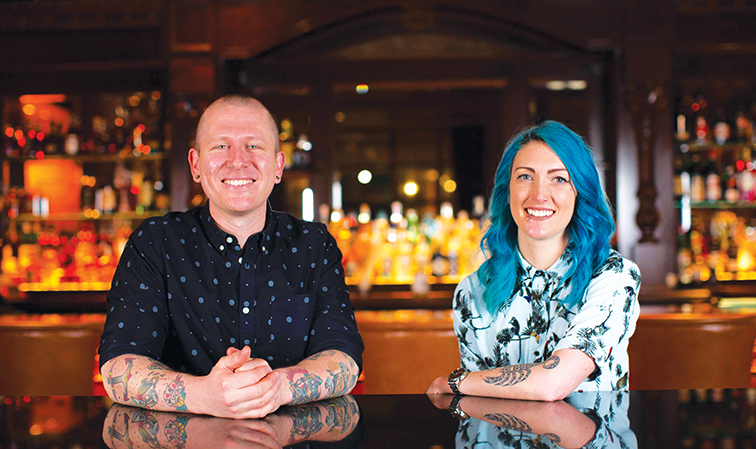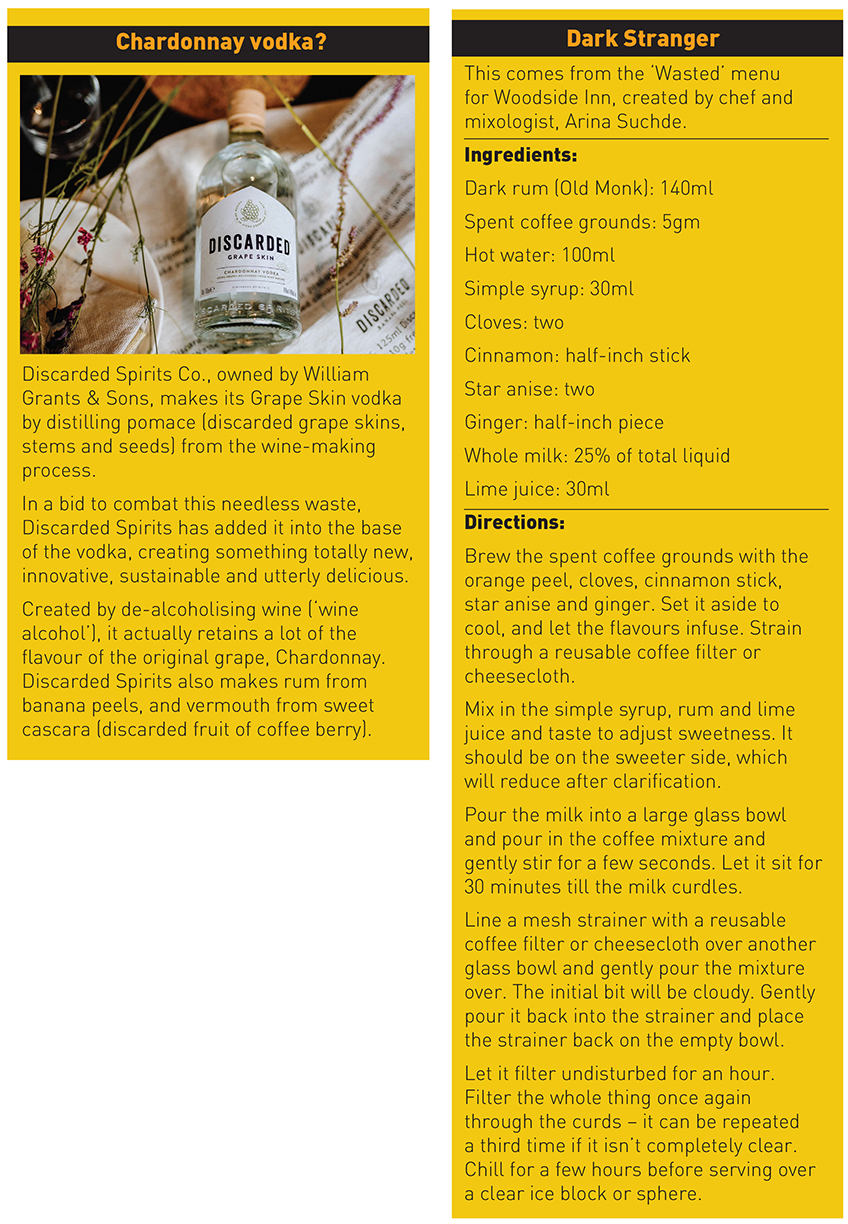Constructing a beverage programme that is conscious of its impact on its environment gives a positive spin, and earns green badges of honour for F&B outlets. Sustainability is great to have for any bar in its repertoire; but what is the philosophy behind the buzzword?
If you have ever worked behind a bar, think about your first day there: what was the first thing you did? For an overwhelmingly large number of us, it was the simple act of filling up two bottles with fresh lemon juice.
You take a few kilos of lemons, you juice them and, when you are done, you throw everything but the juice in the waste bin. In just your first hour behind the bar you have already generated a few kilos of food waste.
How many bars exist in this country? How many lemon peels do they throw away each day? Is it worth our time to think about lemons? This simple exercise gives a glimpse into what sustainability is about.
Sustainability is not the act of saving the environment with a cocktail menu made from local ingredients. It is a holistic approach wherein food and beverage professionals understand the environmental impact of their operations, their overall carbon footprint, the amount of food and water waste generated, and make efforts to reduce these numbers as far as they possibly can.
Business benefits
It is, of course, not just about the environmental imperative; but that is one of the areas where doing some good can mean good business sense – and at the same time leading to bartender upskilling.
As the Covid-19 pandemic impacted the supply chain for food and beverages, it drove up ingredient scarcity and costs and disrupted supply timelines. With bars reporting an increase of costs up to 25% from pre-pandemic levels, there has never been a better time to identify and source local ingredients – which have proven cheaper and produce a lower carbon footprint.
Olive Bar in New Delhi has switched to using good quality berries from India or black currant (falsa) from Uttarakhand. Instead of gherkins, ivy gourd is used. Apart from lowering costs, this also means that menus are more in touch with fresh, local ingredients, with a greater emphasis on seasonal availability.
Sustainability is also a key skill of the modern bartender which prospective employers, especially leading bars and restaurants, value highly. An important aspect of incorporating sustainability into a bar resume is the idea that one can work within the locally available means without expecting a cost premium for every ingredient that goes into a glass, a skill that is especially important for resorts and bars with a limited supply chains.
This skill set, as recent bartending competitions across nations have demonstrated, has also led to a winning cocktail – a cocktail driven by this philosophy also makes for a great story to tell!
The Gen Z consumer further pushes the idea that we are in the golden era of embracing sustainability. There is a growing audience for the stories that a bar can tell through its efforts to protect the ecology.
A recent sustainability report released by Bain and Co. for the Asia-Pacific region indicated that 60% of consumers are willing to pay a premium for “sustainable products”.
Last straw?
A recent example that comes to mind is the ‘Save the Turtles’ movement that gained traction in 2017 after a YouTube video of a sea turtle with a plastic straw stuck in its nose went viral. The resulting online backlash and advocacy against the use of plastic straws resulted in an almost overnight switch for most of the industry from plastic to paper straws.
Leading the charge were large hotel chains such as Marriott and Accor, who restricted the use of straws in all of their bars across India. Nowadays a straw is not provided by default, unless a guest explicitly requests one.
If you either have just embarked upon this journey, or else are on the brink of it, then we’d like to help identify some of the key aspects of a bar’s operations that can be impacted by sustainability, and where we are already seeing a groundswell in select bars across the country.
In fact in recognition thereof, ‘30 Best Bars India’, India’s definite bar awards and ranking platform, are introducing an award this year to recognise a bar that goes the most way towards demonstrating sustainable practices.
Road map
Recycling or up-cycling is about looking at all single-use waste generated in the bar and creating something new out of it. Copitas at the Four Seasons (Bengaluru) and their seed bombs and “plantable” coasters are made using recycled bar order tickets and used as giveaways for guests.
Another notable example is the ‘Wasted’ menu at Mumbai’s Woodside Inn, which incorporates ingredients like coffee grounds, corn husk and banana peels to create cocktails like the Dark Stranger (see box) and Sneaky Sundae. These aim to utilise products that would otherwise see the bin, and turn them into hero ingredients instead.
At New Delhi’s Sidecar, leftover orange peels are candied and supplied to a kombucha brand, which supplies them back a candied orange kombucha that forms an integral part of ‘Mehrauli’, a cocktail in Sidecar’s Dear Delhi menu. At least 90% of the ingredients are, therefore, locally sourced.
A sustainable practice would be to analyse food waste generated in both the bar and the kitchen, and either eliminating the waste generated or re-purposing leftover food waste to create new and interesting ingredients out of it.
A prime example comes from The W in Goa, where kitchen waste from tomato, carrot, broccoli, bell pepper, and citrus peels are converted into stock and an aperitif is prepared for use in the bar!
At Pousada by the Beach (Goa), the mixologist explained that waste from fruits such as watermelon, pineapple and lime are all used for composting.
There is plenty of scope to explore opportunities to create beverage programmes and cocktails that revolve around seasonal produce sourced from local vendors to reflect the terroir of the outlet. Cocktails that revolve around the use of a single ingredient are another avenue.

Founded by Iain Griffiths (L) and Kelsey Ramage in 2016, Trash Tiki is an online resource for bartenders providing recipes and methods to re-use ingredients in bars and ways to reduce bar waste. Check out www.thetrashcollective.com.
Minimalist drinks
Little Red Door, a bar in Paris, for long a member of the World’s Top 50 Bars, recently came to India for a bar takeover in collaboration with PCO Hospitality. Since 2020 Little Red Door has championed a farm-to-glass model for drinks and menu creation.
For Flourish, the bar’s recent menu, it worked directly with producers across farms in France to source produce that forms the base of its minimally named drinks; among them Citrus, Carrot and Chamomile. It firmly places the producer at the centre of the guest experience. Is it any wonder then, that its earlier menu, Grounded, was nominated for the World’s Best Cocktail Menu, by World’s 50 Best Bars?
Chapay Anand, a Hyderabad-based mixologist, won the Brown Forman American Whiskey Legacy Competition based on his single-ingredient cocktail, ‘Chanting Jack’, made entirely using elements from a single fruit: the sweet lime.
The juice was made from the pulp; marmalade from juice and peels; bitters made from peels; and soda made by soaking juice pulp in water before carbonating using a soda maker.
In finding ways to minimise water and electricity consumption in bar operations, a major element that demands attention in this category is ice, which requires both water and energy to be produced. It is one of the most commonly wasted resources within a bar.
Smarter solutions to utilising leftover ice are to melt it in a container and use it for watering plants, mopping floors, etc. Leftover ice can also be used to prepare chilled caddies for beer or soft beverages if the outlet has a banqueting extension. At New Delhi’s Sidecar, leftover ice is melted and the water is provided to passersby as a public service.
Annu Kumar runs JustIce, a supplier of quality ice to bars across the country. Leftover ice, after cutting into different shapes and sizes, is melted and then reused later for different purposes.
Ice is supplied in individual zip-lock bags that are also reused. JustIce has adopted rice husk bags for the supply of ice to bars.
Plastics problem
Perhaps the most important aspect of sustainability is moving away from the use of single-use plastics, packaging materials, water bottles, straws and swizzle sticks. Thankfully a lot of organisations today are stepping away from single-use plastics.
For example, all of the Marriott properties in Pune have switched to an in-house water bottling plant to eliminate the use of plastic bottles, eventually saving a huge amount of plastic products. The Accor chain, as part of its company-wide initiative that goes by the name ‘Planet 21’, also targets to eliminate all guest-related single-use plastic items in the guest experience.
Another good example is Cobbler and Crew in Pune: it compresses all plastic packaging received at the bar and kitchen into discs which are used as coasters in the bar.
Pousada by the Beach in Goa eliminated all single-use plastics and garnishes in 2019 itself. Since its opening in 2009, the bar has exclusively used glass bottles. It uses Volnaa mineral water, served up in recyclable and re-sealable steel cans. For takeaway orders, the bar uses bags made from calcium compounds.
Wealth from waste
A good example of a sustainable beverage programme is the Raffles Hotel in Udaipur (Rajasthan). With the property located on an island, maintaining an efficient supply chain was a challenge. What began as a business expediency has now become an integral part of its bar operations, with the full backing of its ownership and management.
The bar and kitchen at Raffles started by collecting items previously seen as waste: fruit skins, pulp and juice. They then up-cycled them to make ingredients like candies, powders and colours used as ingredients for daily specials or in its batched cocktails.
The pulp is used for juice, the peels are used for syrups, and the leftovers from chopping are used to make liqueurs and bitters. The hotel now grows hydroponic and potted herbs on its bar counters (mint, basil, coriander and curry leaves) and edible flower varietals act as the base of the beverage programme – all grown in and around the bar!
The bar team has also produced stirrers by dehydrating and rolling watermelon skins into edible swizzle sticks. It has a large selection of pickled fruits and vegetables made from leftover trimmings and ex-garnishes.
Linear to circular
While the concept of a sustainable bar has its own merits another interesting phenomenon is how the alcobev space in India today is evolving to embrace sustainability.
Pernod Ricard has initiated the ‘Bar World of Tomorrow’, a responsibility-driven training programme for the hospitality industry. The module and methodology have been developed by the UK’s Sustainable Restaurant Association.
Trash Tiki is an online resource for bartenders (www.thetrashcollective.com), providing recipes and methods to reuse ingredients in bars and ways to reduce bar waste. Founded by Iain Griffiths and Kelsey Ramage in 2016, the duo has done anti-waste pop-ups in over 17 countries (including India), educating bartenders on their anti-waste ethos and creating cocktails made entirely from bar waste.
Pernod Ricard India has begun rolling out this programme for the Indian hospitality industry, with recent training events held in New Delhi, Chennai and Mumbai.
In a linear economy, goods are consumed and the waste is discarded in a bin. In a recycle economy, efforts are made to reuse or up-cycle these ingredients. India as a nation is no stranger to recycling – thankfully, this has caught on as a practice in several bars across the country.
What will be critical now is a transition to a circular economy: it is one in which we rethink the practices itself that are leading to the consumption and waste of a certain amount of resources.
Alcobev and hospitality professionals must understand the raw power they wield when it comes to pushing organisations and consumers alike to embrace these ideals, to be conscious of the impact that our eating and drinking habits have on our planet, and to understand that the smallest of actions today can lead to a more sustainable tomorrow.














